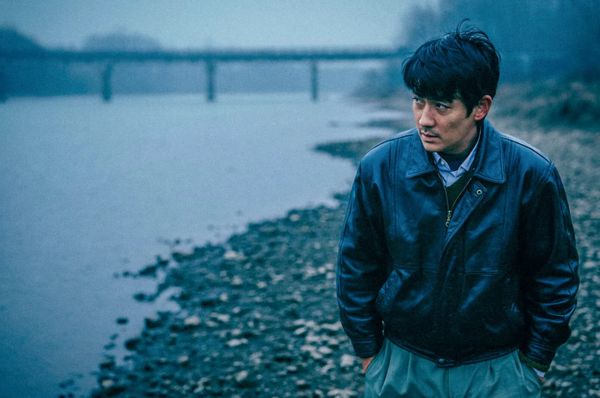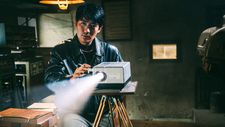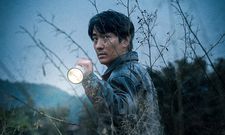 |
| Only The River Flows |
Chinese director Wei Shujun's Nineties-set crime thriller, Only The River Flows (He Bian De Cuo Wu), follows Police Chief Ma Zhe's (Yilong Zhu) investigation into the murder of a woman found near the river in Banpo Town, rural China. Despite a quick arrest and the eagerness of his superiors to close the case, when Ma Zhe pursues other evidence, he struggles to explain why three unrelated murders resemble one another.
Only The River Flows represents a departure for Shujun after his 2020 feature debut, Striding Into The Wind (Ye Ma Fen Zong), about a film student's road trip across China, and his 2021 sophomore feature, Ripples Of Life (Yong An Zhen Gu Shi Ji), set on a chaotic film production in a remote town.
In conversation with Eye For Film, Shujun discussed philosophy, psychology, and the limitations of the human perspective. Readers should be aware that there is a spoiler in this interview.
Paul Risker: How do you interpret the way Albert Camus' opening quote about fate relates to the film and its main character?
 |
| Only The River Flows |
Wei Shujun: It's woven into the protagonist's experience of this crime solving journey. He doesn't know that there's almost a God's viewpoint, where someone or some being has already written the script and he's an actor in it. He thinks he can control things, but he can't. Everything has been designed and organised for him and he only gets the script step by step as events unfold.
PR: There's an interesting, if not important, scene in which a child tells the detective they want to see the bad guy when he catches them. The scene plays with the idea that both children and adults are naïve in believing there's order and a sense of closure, in a story that deliberately orchestrates confusion.
WS: The interpretation of a certain scene, a certain shot or work, is subjective. There's no absolute right or wrong, but when I read this part of the novel, I was a bit horrified by the psychological thrill in it, as in the child wanting to see the murderer. And in the end, the child did see the murderer...There's a philosophy in this, that is, when you stare into the abyss, it stares back at you.
The more things unfold, the less sure the detective feels about the case. So, the more he knows, the less he knows, which sees things become less clear. That's also the philosophy, because in order to feel safe as human beings, we need to understand. Once you cannot explain something, for instance with this detective, things seem to be more and more inexplicable. To him, it is getting more confusing and perhaps that's what you mean about being out of control, which is something about our cognitive psychology as well.
PR: I wonder if it's a case that psychologically, when the answer is too simple, we convince ourselves that it's incorrect. Does Only The River Flows exploit this flaw?
WS: I think there are two sides to this psychology. One is that the audience already has a preconception that things cannot be simple. The murderer revealed in the early stages of the film cannot be the actual murderer. That's the experience many audiences will have in a crime drama, because they expect something more complicated.
The other thing is, the detective cannot explain in his logical mind why three unrelated people have been murdered in the same way. He finds inspiration from his dreams, but dreams are just dreams; they are not rational. So, he cannot reconcile these two ideas, and as filmmakers, we're also fighting against the audience's expectation of not revealing the murderer in the first instance.
PR: Perhaps the complexity in Only The River Flows comes from emotion and not the mystery?
WS: Truth or reality has a certain appearance, but as human beings we can only recognise or understand, see or perceive a side of it. It's one facet of a certain truth. I remember the saying that we human beings are the universal yardstick. We determine things according to our own past experiences.
 |
| Only The River Flows |
PR: Is Only The River Flows a departure from or evolution of your earlier films?
WS: I would use an analogy to explain this. On a piece of land I own, I plant three things - I am the common factor. I am the farmer that planted and grew these three things that are all different. Or it's like three different paintings by the same artist. I cannot verbally explain what the relationships are or how they evolve, but I'm the common factor.
PR: Returning to the film's opening quote, do you believe in fate?
WS: I believe in fate, not as a grand design sort of thing, and I believe our views, knowledge and experiences always go out of date at some point. The facts are the facts; they are there, and reality is there - they don't go out of date. So, that is how I see fate.
Sometimes we come across things that are too great for us to comprehend. We have our limitations which prevent us from understanding, but that is the fact. When we are faced with such things that go beyond our comprehension, we have to accept that it's not something we have the knowledge and ability to understand.
Only The River Flows is released theatrically in UK and Irish cinemas on Friday 16 August.





















